When we moved to Portugal back in August of 2019, we had big dreams. We’d immerse ourselves in Portuguese culture. We’d eat bread and cheese and olive oil and fresh produce. We’d drink good wine. We’d travel Europe, maybe even rent a camper van and do a big summer tour like all the Europeans. We’d take the kids to Disneyland Paris. We’d learn Portuguese. We’d finally, finally have that immersive, long-term experience we’ve craved for our family.
And, at first, we did. After a bumpy first couple of weeks, we grew to love Portugal. We settled into a quiet oceanside village. We enrolled our daughter in a charming international school she loves. We made friends. We spent mornings and afternoons at the beach. We hiked in the mountains and alongside cliffside trails. We ate our weight in bread, cheese, and fresh produce—and moderately consumed amazing (cheap!) wine, much of which is produced here in Portugal.
We started to wonder, Is this really happening? Did we really end up in this amazing place? Are we going to finally make our ten-year-plus vision a reality, living with our two children in a foreign country and exposing them to the wide world?
I even wrote a post and recorded a podcast episode about how much we love it here. And they were sincere: we do love it here.
And then the pandemic hit.
Did we have the coronavirus?
Here in Portugal, we started talking about novel coronavirus—this was before the official term, COVID-19—well before the rest of the world, or at least before the United States. Europe seemed to get the gravity of the illness because of the situation developing in Europe. At the beach one Sunday in early February, my friends and I talked about Italy as our kids built sand castles and searched for driftwood. My friend mentioned how she had a trip planned to Italy in April but was planning to cancel because it didn’t seem like a safe idea to go there. I talked about my upcoming trip to Phoenix, Arizona, to give a keynote, and how I’d heard there were a couple of cases there, and I would be extra careful on the planes.
Of course, at that time, even we weren’t concerned about community spread.
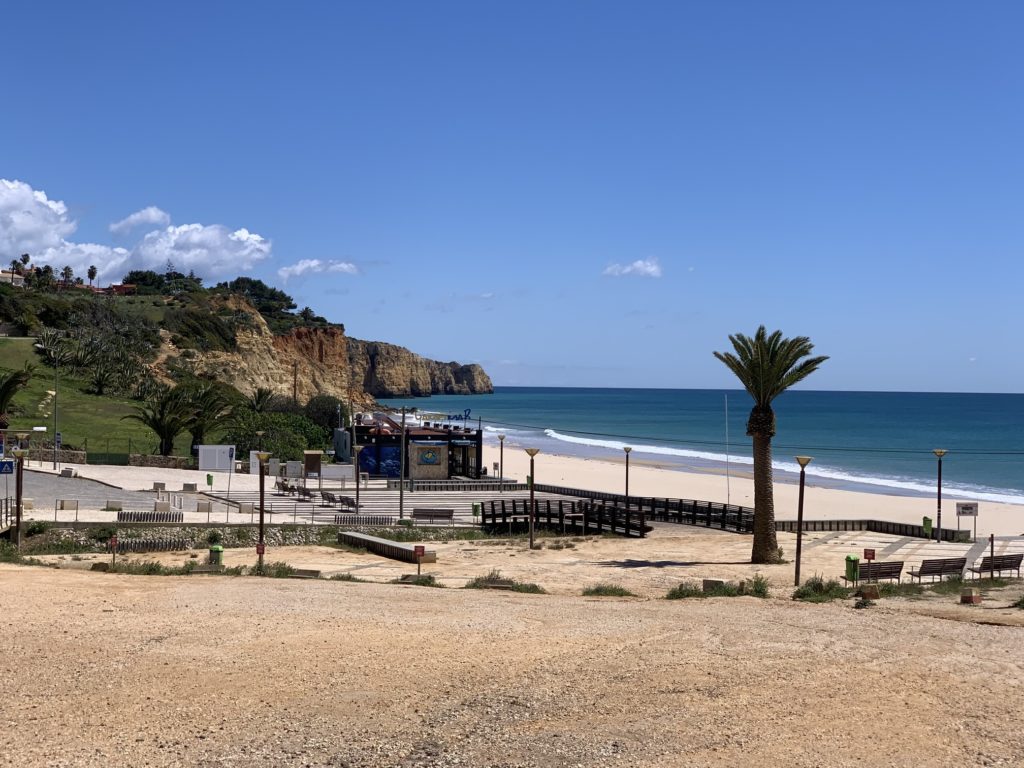
An empty beach in Portugal’s Algarve. This spot is always full of at least dozens of people all day, every day: families, surfers, and beach and restaurant goers. Now it sits empty, closed by Portuguese government to stop the spread of COVID-19.
The following week, I got sick. I was exhausted and worried I’d get sicker before my trip, so I pumped my body full of every vitamin I could get my hands on. I lost my voice, and my throat felt like it was full of sharp cotton. On Valentine’s Day, I left for my trip, my voice still nearly gone. At the Lisbon airport, I went to the pharmacy and bought zinc and vitamin C.
It never once crossed my mind that it could be anything other than a cold. I was prone to voice loss—this had happened two or three other times in the past couple of years. I didn’t know anything about the novel coronavirus other than the pneumonia concern.
On the plane, I have never seen people so paranoid. Passengers wiped down their entire area: tray table, seat back, head rest, arm rests. I watched a man in front of me kneel on his seat to disinfect the windows, then stand to wipe down the attendant call button and light button. Passengers sanitized their hands once, ten times. And it wasn’t just parents and older people—it was everyone. I was witnessing a disinfection frenzy.
Twenty-two hours later, I arrived at my airport hotel in Phoenix. I wasn’t doing well. The next morning, I ran through my keynote and then took an Uber to a pharmacy, then another one, looking for concoctions to heal my throat. My one and only concern was my lost voice—I wasn’t feeling awesome, but I didn’t care about that. I needed my voice back.
That day, I sat in a steam room twice on the suggestion of my director friend, who had lost her voice lots of times during plays and knew all kinds of emergency tips. I took zinc and continued with the throat lozenges. By that afternoon, jet lag set in, and I was exhausted, wanting to take a nap, when my phone rang. It was my husband: all three of them had fevers, and my son had a seizure from the fever (not atypical for him, but still horrible). They went to the doctor. The diagnosis: likely a viral respiratory infection. Virus unknown.
My throat got better enough. I was a little raspy for my keynote but felt fine. My husband and kids, on the other hand, had developed a deep cough. Our daughter’s fever had spiked and gone down, spiked and gone down, again and again. When I got home, they all seemed mostly fine during the day but fell apart at night. They were coughing so bad at night our son couldn’t breathe and threw up every night for two weeks. My husband slept in the basement for a week because his coughing kept the entire house up at night. My husband and son had headaches that were so bad ibuprofen didn’t make a dent in the pain. It would take another three to four weeks for them to fully recover.
I looked back on texts during this time, and my husband said things like “this doesn’t seem like a typical flu.” Still, it didn’t cross my mind until a few weeks ago that it could be the coronavirus.
We live in a tourist spot. That means that people from all over the world, including China, travel here regularly. With a large expat population, international travel is also big. Living in a tourist destination, and an expat area, means you’re inevitably exposed to lots of different viral and bacterial illnesses—way more than a typical town.
Could we have had COVID-19? Maybe. I hope to get the antibodies test soon.
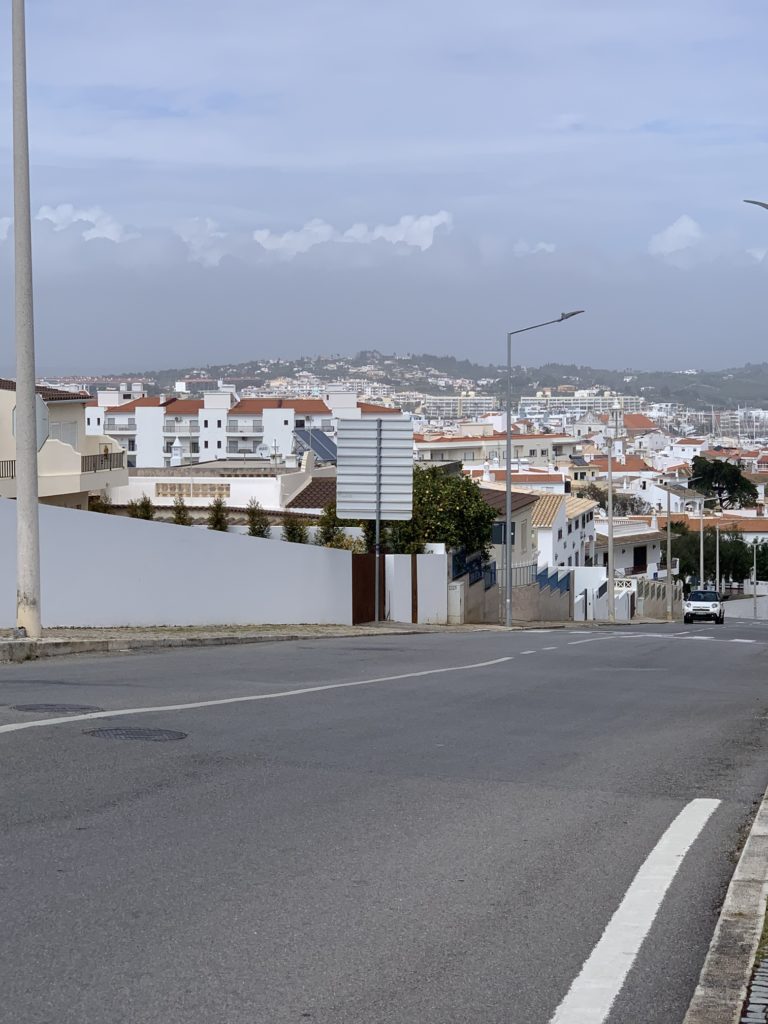
A lone car on a normally heavily trafficked area during tourist season, which typically begins in April.
The situation in Portugal
Whether we had the coronavirus or not, one thing is certain: we are living in a foreign country during a pandemic.
This is the first global crisis I’ve ever adulted through. I was too young to fully appreciate the 2008 crash. I graduated college in 2009, and I remember not believing all the noise about the economy. I’d landed a job easily overseas—but that was overseas, not in the US. It wasn’t until we returned home in 2010 that we realized just how serious the situation was here. But I was in graduate school, fully funded with a paid research assistantship. We were good. And by the time I was done with graduate school, my business was starting to do well. Sure, my husband couldn’t find a reasonable job as a teacher, but my business was growing.
What recession? I remember thinking.
Now, I’m a full-on grown-up with two kids and household bills. I support a wonderful part-time subcontractor who has worked with me for two years. I hire other subcontractors to support my other projects. I am the sole earner for my family. So when I realized the economy was tanking, believe me, I noticed.
Living in Portugal, though, has been a split experience. I follow news here and news back home. The state of Portugal impacts my health, safety, and day-to-day life; the news in the United States impacts my ability to support my family. I’ve watched with keen attention as the stock market plunged. I’ve seen the financial impact on my business, though thankfully so far it has not been catastrophic.
I mentioned early that we noticed the global COVID-19 situation here in Portugal more than in other parts of the world. The government, so far, has responded quickly. I’ve been impressed at the swiftness of action; I’ve been encouraged by the practicality and discipline of the Portuguese people. My sense is that, as a collective, they understand the part they play in ending this pandemic.
Daily, a bombeiro (fire department) truck drives by: “Seja responsável. Fique em casa,” the fireman calls out over the loud speaker in Portuguese. Then, in English, he says, “Be responsible. Stay in your house.”
The beaches are closed. The restaurants have shuttered, with the exception of the few that do takeaway. All nonessential workers are ordered home. Be responsible, the government seems to be saying in these rules. Do your part to flatten the curve. The president has been setting an example for the people, following his own recommendations as best he can while leading a country. The country deeply values democracy—they were under a dictatorship until the 1970s and citizens are highly skeptical of anything that seems to go against basic freedom—and so, the government has been clear but has held back from offering overbearing rules. They are, however, reinforcing the stay at home orders through arrests.
As of this writing, there have been 13,141 confirmed cases and 380 deaths (you can see current stats here). My area of Portugal has been least hit, with the north part of the country and Lisbon bearing the brunt of infections. The national numbers are low, in my view, given our proximity to Spain and Italy. And I feel that the government has done a good job of responding to the threat of COVID-19 and flattening the curve.
We are allowed to leave to exercise and to run essential errands like grocery shopping and delivering items to vulnerable people. I’ve been dealing with back issues, though, so I haven’t left the house except for walks. Yesterday, I finally got on my bike and rode to a nearby town. It was surreal seeing the normally bustling beachfront completely empty. Restaurants were shuttered. Parking lots were mostly empty. A few people were out on walks or on their bikes but otherwise the streets were bare.
On the main road on the way back, someone honked at me and drove close to my bike. The roads in Portugal are narrow anyway, with barely enough room for cars to pass on a two-lane road, so this car purposefully driving right next to me with no oncoming traffic and honking startled me, of course. The message was clear: stay home. I’m allowed to be out, and exercise is an important way of staying healthy, but this person seemed to be social shaming me the way I’ve read about it happening in other places like New York. Even if we’re allowed, is it worth it?
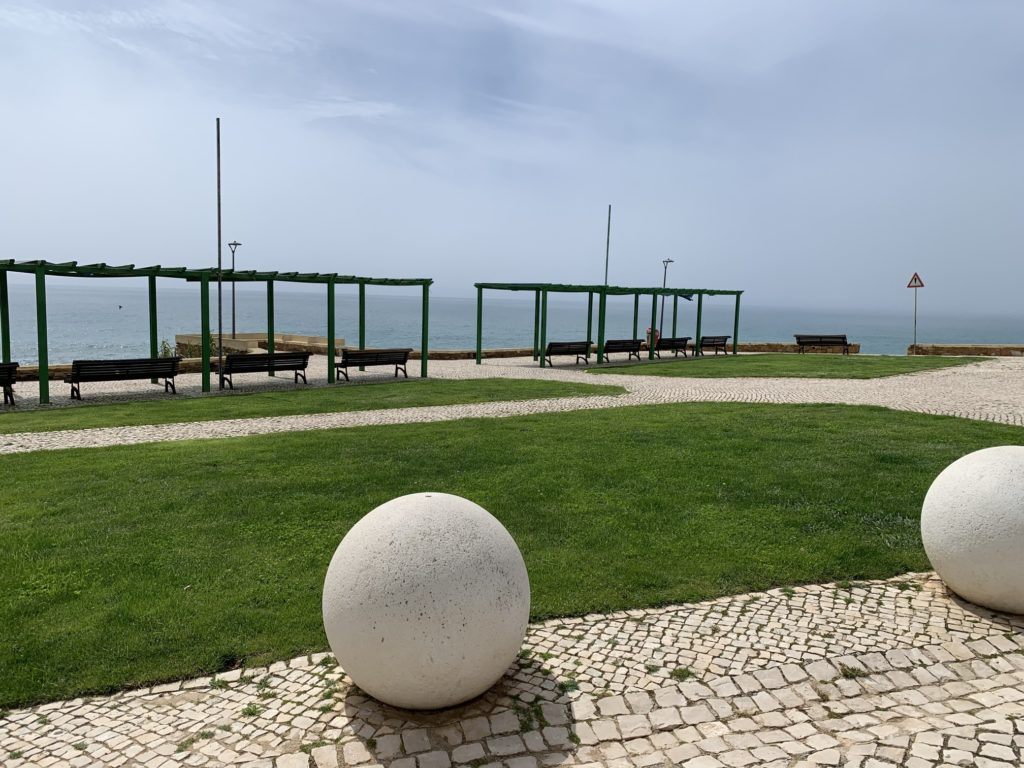
Normally bustling with locals and tourists, this viewpoint is vacant even during midday, when this photo was taken.
The last thing I’ll report: having flights cancelled to the US has been discouraging. While I’m glad to be here, and grateful for so many things about being in Portugal during this time, I also don’t like not being able to get home if I need or want to. What if one of my family members gets sick? What if my husband or I get sick? What if something else happens that has nothing to do with COVID-19? These thoughts come and go throughout the day, but there’s no point in dwelling on them. It’s our reality: we cannot leave.
So, what is it like to live in Portugal during a pandemic? It’s much like what it’s like to live through a pandemic anywhere in the world. Things are strange and uncertain. But there are also so many moments that are heartwarming and give me deep faith in humanity. If I can’t be home in Idaho, I’m glad to be here.
Tell me, what’s it like where you live? How has your local and federal government responded? I’d love to learn about your experience.
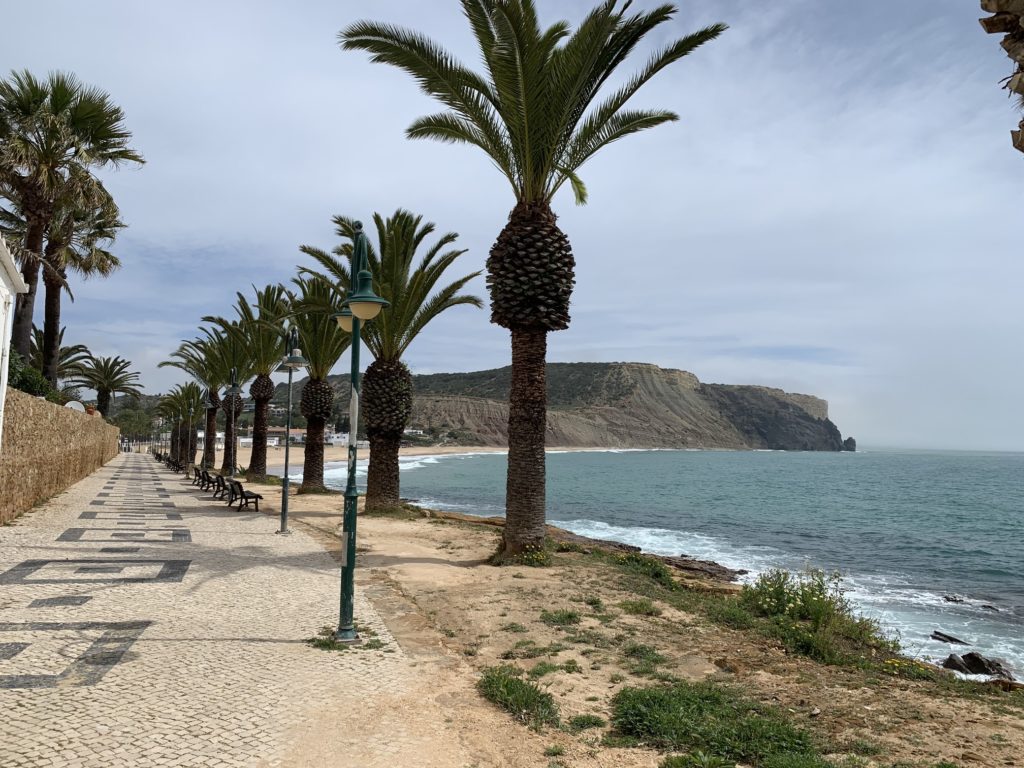
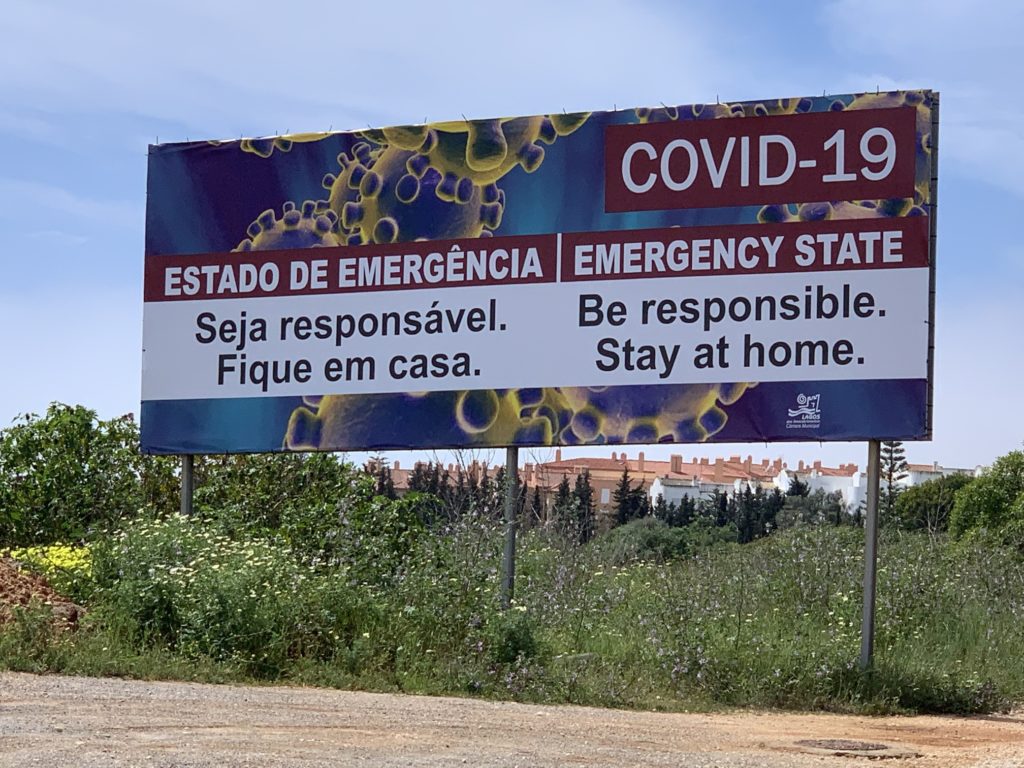
Hi Stacy. Gee you guys h ave been through it recently.
Down under in Australia we have lock down in every state, fines for breaching the travel interstate bans. No more gatherings only 2 people.
We can still excercise but no gyms are open.
I posted an article on linked in ( Tighten the Belt). I shared a story about my grandparents. They survived on bread and dripping during the Great Depression and in both World Wars lived on food vouchers.
My Grandparents would say” in a recession we all had a belt to tighten. In a Depression we didn’t have a belt to tighten”.
I am very blessed and thankful I can still go shopping and get most things I need.
Lock down is working well here. Most people are making the best of it.
My time is spent mapping my second fiction book.
I don’t think we are far away from a vaccine. Scientists here have now simulated the virus.
LIFE throws us many challenges but I always remain as positive as possible.
Take care Stacy.
Best Wishes to you and your family.
Rod Richards from Australia
Thank you for reading and commenting, Rodney. What an interesting way to think of it—tightening the belt versus not having a belt to tighten. I remember my grandma telling me about growing up during the Great Depression in Kansas, but I was too young at the time to fully understand how hard that must have been. I know that experience stuck with her and shaped a lot of her views about money later on. How could it not?
A book is a wonderful way to spend time during lockdown. And positivity is the best way to approach uncertain situations like this one! Take care, and thanks for sharing your experience and thoughts.
Stacy, thank you for sharing your story and for being vulnerable enough to share the worries and fears you have to fight off almost daily. I can’t imagine how difficult it is to be so far from home during a pandemic and have young children to think of / care for. As you know, I chose to take a mid-career break in February this year (right as the Coronavirus took front stage in the US). Obviously many of the plans I had for my time off from work have been paused and I find myself having to reset my own mindset daily. I can’t truly invest in myself and others if I spend the day thinking about “What If’s.” I start each day with exercise, refresh half way through the day with meditation and journal each evening to reflect and re-focus. It’s not easy and I can’t imagine it is for you either. Thank you for blogging. Thank you for sharing your worries / concerns and how you’re overcoming and being productive in the crazy world that we live in today. You are making a difference.
Thank you for this thoughtful note, Jen! I think of you often and how strange this timing must be for you. Just as you set out for a journey of exploration, you’re halted in place. I agree with you, the “what ifs” can paralyze us, and there is no point in giving our energy to worry. But we are also human, and that means we have to make a daily choice to remain positive in the face of uncertainty—just like what you describe.
I love the idea of refreshing halfway through the day with meditation, and journaling each evening (versus in the morning). I’ll try out those strategies and see if they impact my day. I appreciate you and can’t wait to see what the next stage holds for you! My hope is this necessary pause will end up being even more powerful than what you could have planned in normal times.
good read Stacey, you all doing ok now ? is Doug training ? hopefully we will see a relax coming soon where we can enjoy outside life again 🙂 regards to Doug 🙂 stay safe,, Karl
Thank you for reading and commenting, Karl! Yes, we are doing well—even finding a rhythm that is working well for us. Doug is training but doing a lot of his riding indoors on his smart trainer. We are likewise looking forward to life outside! Take care and stay well.
[…] I’ve traveled to Vietnam, China, England, multiple US states, and of course Thailand and Portugal. (“Aren’t you worried traveling all by yourself?” Not really. But I sure have […]
[…] a few months later, the pandemic hit. (In fact, I still suspect we had the virus in February, but I digress . . […]
[…] a few months later, the pandemic hit. (In fact, I still suspect we had the virus in February, but I digress . . […]